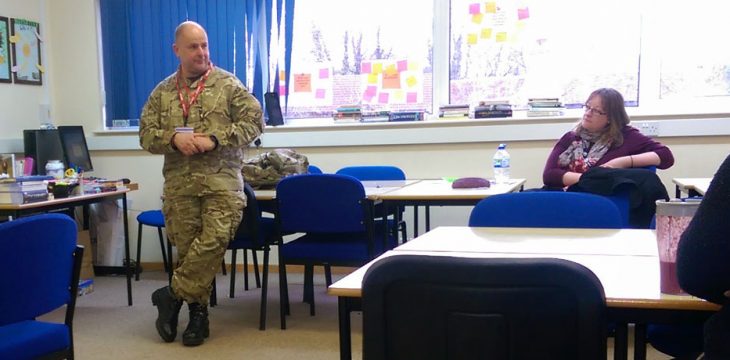Serving Army Officer Works With Students Studying Impact Of War

With our A Level English Language and Literature students studying the impact of war, who better to discuss this with than a serving officer in the Army? Lieutenant Colonel Lyndon Robinson from the Army HQ, in Andover, visited the students recently to share his experiences of war which includes frontline tours to Afghanistan, the Falklands, Iraq and Northern Ireland.
Army life is not all about fighting and injuries; the Lt Col also discussed the positive side of being a soldier and how the army is a career, providing training and education. He spoke to the students about the sense of comradery in the army and the relationships between officers and their regiments and the support available through a number of army charities.
As part of their A Level, students also studied ‘The Two Worlds of Charlie F’, a play written by Owen Sheers, based on real-life interviews he conducted with soldiers who have been injured during the conflicts. The play was originally devised as a one off performance as part of a rehabilitation project, but was so well received that it went on tour in the UK and Canada last year.
Coincidentally, Lt Col Robinson, who also saw the play, was so moved by it that he arranged for the DVD to be shown in HQ to give others the opportunity to see how these stories are being told. The students discussed with the officer the way the public are informed about the effects of conflict and how the impact on individuals is conveyed.
English Lecturer Carys Overfield comments: “The impact of war on the individual is the focus of the coursework for A2 English Language and Literature students where they have a creative writing portfolio. The experience of hearing and talking to the Lt Col, as well as meeting Owen Sheers last summer, has given them a lot of material to use as part of their research and wider reading.
“They have all commented on the positive outcomes of these opportunities, and I think in some cases they have been given food for thought and seen different views that aren’t necessarily the ones that are based purely on media and public perceptions.”